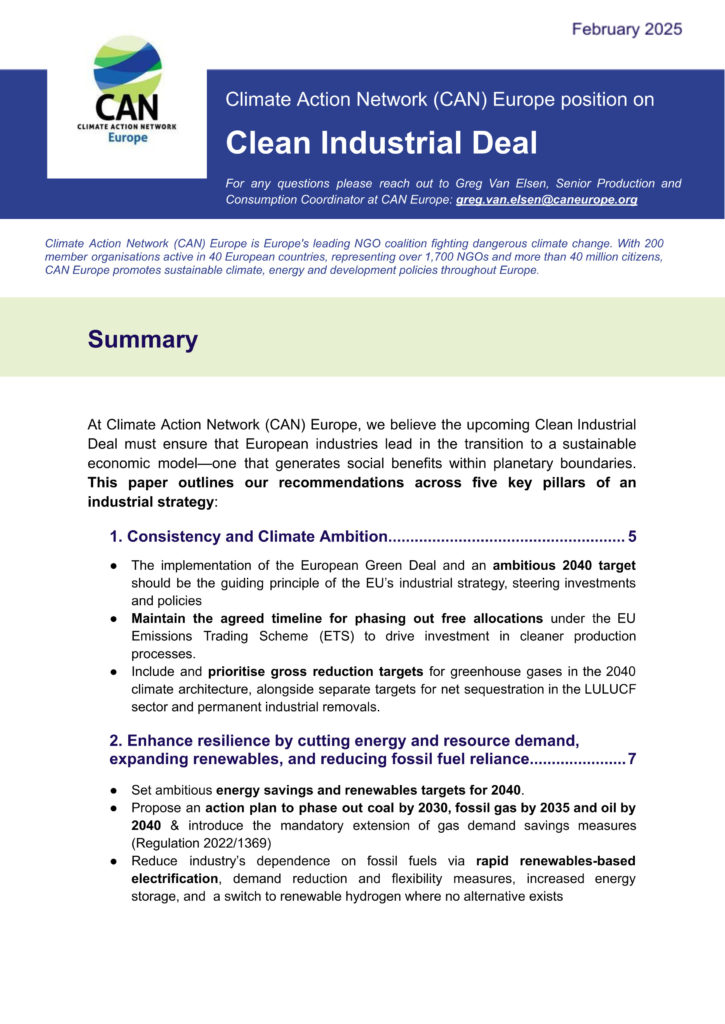At Climate Action Network (CAN) Europe, we believe the upcoming Clean Industrial Deal must ensure that European industries lead in the transition to a sustainable economic model—one that generates social benefits within planetary boundaries.
Chiara Martinelli, Director of Climate Action Network (CAN) Europe said:
“The Clean Industrial Deal must not become a blank cheque for polluters—and a few days before its publication the risk is real. Europe’s industrial policy must build on the implementation of the European Green Deal and feature an ambitious 2040 target as its North Star, driving the much-needed real cuts in emissions. The Clean Industrial Deal should include clear and concrete environmental and social conditionalities embedded so that it powers up renewables, backs sustainable industries and innovative frontrunners that we have in Europe, and creates future-proof jobs. Strong safeguards must be put in place to guarantee that public funding benefits people and the planet, not corporate profits.“
This paper outlines our recommendations across five key pillars of an industrial strategy:
1. Consistency and Climate Ambition
- The implementation of the European Green Deal and an ambitious 2040 target should be the guiding principle of the EU’s industrial strategy, steering investments and policies
- Maintain the agreed timeline for phasing out free allocations under the EU Emissions Trading Scheme (ETS) to drive investment in cleaner production processes.
- Include and prioritise gross reduction targets for greenhouse gases in the 2040 climate architecture, alongside separate targets for net sequestration in the LULUCF sector and permanent industrial removals.
2. Enhanced resilience by cutting energy and resource demand, expanding renewables, and reducing fossil fuel reliance
- Set ambitious energy savings and renewables targets for 2040.
- Propose an action plan to phase out coal by 2030, fossil gas by 2035 and oil by 2040 & introduce the mandatory extension of gas demand savings measures
- Reduce industry’s dependence on fossil fuels via rapid renewables-based electrification, demand reduction and flexibility measures, increased energy storage, and a switch to renewable hydrogen where no alternative exists
- Reduce the consumption of primary materials and increase secondary-use rates of key materials by up to 70-80% through more circularity
- Review public procurement rules to maximize the impact of the 14% of GDP spent by public authorities, prioritizing best-in-class products and services from both social and environmental perspectives.
3. A people-centric approach to industrial transformation
- Structurally embed strong social and environmental conditions within the EU’s industrial policy framework, including no relocation clauses, compliance with social and labour standards as well as responsible tax behaviour.
- Develop a place-based EU industrial strategy that stimulates the development of industrial value chains across the continent, maximises regional competitive advantages and avoids a two-track transition.
- Introduce A just transition directive to anticipate and manage change in the world of work, especially in fossil fuel-dependent industry
- Clean and equitable Trade and Investment Partnerships (CTIP) must include clear, measurable and bespoke sustainability commitments to support the development of clean industries and value chains in partner countries, including technology transfer
4. Targeted investment for industrial transformation
- Develop a Social and Green Investment plan supported by €1 trillion-strong Next Generation 2.0 fund with a strong Green Industry pillar
- Additional support to industry be funded by fresh own resources, without diverting existing funds earmarked for climate, environmental, and social investments from current and future EU funds
- Prioritise investment in grids, renewables-based electrification, energy efficiency actions and projects and renewable energy sources for affordable energy,
- Redirect existing harmful expenditures (such as fossil fuel subsidies) towards support for the energy transition and industry decarbonisation
- Additional Important Projects of Common Interest (IPCEI) should go to proven technologies that can support a 100% renewable energy scenario, including for energy efficiency projects
- Any extension of the Temporary Crisis Framework or reform of State Aid rules should be made contingent on the financing of joint EU funding instruments
5. Inclusive governance for effective and transparent EU industrial policies
- Include civil society and social partners in the governance of industrial policy
- Create an independent observatory to monitor and evaluate EU industrial policies
Greg Van Elsen, Policy Lead for Clean Industrial Deal at CAN Europe, said:
“Europe’s reliance on imported energy and raw materials makes us vulnerable, pushing up costs for both industry and households. To build a more resilient economy, we need to use energy and resources more efficiently: helping industries to do more with less and cutting our overall material footprint. Clean industrial policies can strengthen our economic security, making Europe more self-sufficient, competitive and sustainable.
Europe’s industries are under pressure, from declining manufacturing to large-scale restructuring in both traditional and net-zero sectors. In coal-dependent regions, economic shifts will hit hard, and for millions of Europeans, these changes are compounded by the cost-of-living crisis. The Clean Industrial Deal must deliver socially just outcomes, ensuring no one is left behind. That means addressing the distributional impacts of policy, supporting workers through the transition, tackling skills shortages, and putting equity at the core. Most importantly, it must create well-paid, quality jobs for people across Europe.
After decades of neglect, industrial policy is back but without a clear direction. It risks propping up fossil-fuel incumbents instead of driving an industrial transformation that cuts emissions and promotes circular, sustainable production. The EU must prioritize investment in net-zero industries like grid and battery manufacturers, not handouts that lock in the fossil past.”
Further resources: CAN Europe’s key asks on Affordable Energy Action Plan




